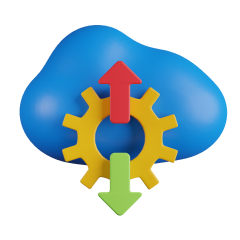
Got a Project? Tell us about it!
We are a leading custom software development agency focused on web, mobile app development & SaaS application development & MVP Development.
How to Develop and Grow your SAAS Application?
- Development
- SaaS Application Development
- Technology
Our experienced team of UX/UI designers and developers will help you stand out with a beautifully designed UX/UI.
What is Saas Application?
 Software as a service (also referred to as SaaS) delivers software as a service over the Internet. Instead of installing and maintaining software, you simply use the Internet to access it, freeing you from software and device maintenance complexities. SaaS applications are also known as web-based, on-demand, and hosted software.
SaaS apps are hosted on the servers of a SaaS provider, regardless of the name. The provider is in charge of application security, availability, and performance. Consider a bank that protects the privacy of each customer while providing dependable and secure services to a large number of people.
Customers of a bank have access to the same financial systems and technology, so they don't have to worry about their personal information being accessed without their permission.
Software as a service (also referred to as SaaS) delivers software as a service over the Internet. Instead of installing and maintaining software, you simply use the Internet to access it, freeing you from software and device maintenance complexities. SaaS applications are also known as web-based, on-demand, and hosted software.
SaaS apps are hosted on the servers of a SaaS provider, regardless of the name. The provider is in charge of application security, availability, and performance. Consider a bank that protects the privacy of each customer while providing dependable and secure services to a large number of people.
Customers of a bank have access to the same financial systems and technology, so they don't have to worry about their personal information being accessed without their permission.
Different SaaS Application Examples
 The difference between SaaS and traditional software is that SaaS does not need to be downloaded or installed on a computer or user device. Here are a few different types of SaaS applications:
The difference between SaaS and traditional software is that SaaS does not need to be downloaded or installed on a computer or user device. Here are a few different types of SaaS applications:
1. Box
Box is a publicly-traded software as service company that specializes in cloud content management and file sharing. It's cloud-based, multi-purpose corporate software that lets them communicate, automate, share, and manage material and data. It enables secure file sharing and data access from a desktop, mobile device, or the internet. Team members can communicate and discuss everything about the document they're working on in real time. Box Relay is an excellent SaaS product for task automation. It allows you to automate marketing, sales, human resources, administration, and finance operations.2. Canva
Canva is an online design tool for businesses that helps you create social media content. It's a simple SaaS solution with a drag-and-drop interface. It comes with a slew of templates to help you get started right away. Choose a template, make changes to it, save it, share it, and save a copy. There are graphs, blog post photos, PowerPoint presentations, book covers, social media posts, PPC advertisements, posters, flyers, invitation cards, and a variety of other media formats available. Because it is free to use, Canva is an excellent SaaS example. You will have limited access to its media as a free user, but it will function normally. Canva has over 15 million monthly active users and made $291 million in sales in 2019.3. Google Apps
Google offers the best (and generally free) SaaS and cloud services tool for both personal and commercial use. G Suite is a Google Cloud SaaS application suite that includes a number of cloud-based applications. G Suite is made up of Gmail, Calendar, Hangouts, Google Drive, Sheets, Docs, Forms, Slides, Sites, Vault, and a few other apps. I'm sure you've used the majority of these apps without realizing they're all cloud-based, with no on-premise software. Google applications are cost-effective and help organizations run more efficiently because they facilitate sharing, collaboration, and project management. G Suite makes interacting with colleagues and sharing comments and progress on a project with team members a breeze. For instance, Google Drive lets you save, edit, and share files from any computer or mobile device in real-time.4. Slack
Slack is a cloud-based business communication app that is a great example of software as a service. It promotes itself as an email substitute, which it is. Slack allows businesses to manage, coordinate, and interact with teams from a single dashboard. Communication and organizational channels must be established. Slack has more than 10 million daily active users and over 85K paying businesses. It made more than $4 million in revenue in 2019.Our experienced team of will help you stand out with a bespoke, flexible and scalable software application for your business.
5. Hubspot.
HubSpot is a well-known software as a service (SaaS) platform for businesses and even enterprise software companies. It offers businesses sales, marketing, CRM, CMS, and service software. Marketing software helps businesses attract visitors, convert them into customers, close deals, and keep them. It's a one-stop shop for marketing, sales, and customer relationship management (CRM). HubSpot's main selling point is its low price; its SaaS products include free trials. You'll like HubSpot's content marketing strategy. If you run a SaaS company and are having trouble getting people to visit your website, you should learn from HubSpot. It publishes a large number of blog posts in a single day and covers nearly every topic that is directly or indirectly related to its main programs.6. Amazon Web Services (AWS)
Nothing beats Amazon Web Services as a SaaS example (AWS). Databases, IoT, business applications, machine learning, storage, robotics, security, customer interaction, blockchain, and other AWS services are available to organizations and individuals. You can use any internet-enabled device to access the applications because they are all cloud-based. Amazon Web Services (AWS) is a $25.6 billion company with over a million users. NASA, the United States Navy, and Netflix are just a few of the world's most prestigious organizations that use AWS. AWS is an excellent example of a successful SaaS company with billion-dollar sales that offers a variety of SaaS products, and there is a lot to learn from it.7. Dropbox
Dropbox is a well-known cloud storage SaaS company that allows businesses to save, share, and collaborate on files and data on the go. It gives you a smart workspace where your employees can work from any location. Dropbox is an excellent SaaS solution for businesses that rely heavily on freelancers and remote workers. The smart content suggestion feature is an excellent feature that suggests content based on your Dropbox activities. Dropbox Paper is a collaborative document that allows team members to collaborate without barriers. Dropbox is a great SaaS example because of its ease of use. Its popularity stems from its ability to store and share files over the internet while also synchronizing them in real time. Dropbox has over 500 million registered users and earns $1.4 billion in revenue.Technologies used to Build SaaS Application
 The technology you use to build your SaaS application is critical to its success. Here's a rundown of the technologies that go into creating a SaaS application:
The technology you use to build your SaaS application is critical to its success. Here's a rundown of the technologies that go into creating a SaaS application:
Our experienced team of android developers will help you stand out with a efficient and fast mobile app for your business.
1. A SaaS application's front-end
The front-end is the part of a SaaS program that a user sees and interacts with. To function as a frontend, most web applications require three major components:- HTML (HyperText Markup Language) is a technique used by web developers to finalize the structure of content on a web page. You can also use HTML 5's newest version to easily arrange audio and video content on the front end of your app.
- CSS: Cascading Style Sheets (CSS) style the HTML written page in a desirable manner, as the name implies. It basically formats the text and gives it a distinctive look and feel.
- JavaScript is a programming language that allows web designers to include interactive elements in their pages. Because of JavaScript, users can only interact with the program.
2. A SaaS application's backend
In layman's terms, the backend is the part of the program that allows it to function. It includes techniques like creating business logic, creating databases to store data, and hosting the program on servers. As a result, the backend of a SaaS application consists of the following components:- Frameworks and programming languages
- JavaScript (NodeJS, MeteorJS, ExpressJS)
- PHP is an abbreviation for PHP (Laravel, CodeIgniter)
- Ruby (Ruby on Rails)
- Python is a programming language (Django, Flask)
- Scala (Play)
- Server
- Catalogue
Our experienced team will help you stand out with a bespoke, flexible, and scalable SaaS application for your business.
Tips to Grow your SaaS Application Startup

1. Concentrate on the needs of the client.
It's critical to make sure there's a demand for the product or service you're delivering as an on-demand delivery service before starting a new business. To do so, conduct research before implementing your plans. When offering a product as a service, it's better to conduct focused small-scale tests before diving headfirst into unproven and unknown major commercial amenities. Your product should ideally be adaptable and focus on a variety of features. If your customers find it difficult to use your product, it will not be as popular or successful.2. Develop a method for acquiring new users that is scalable.
People believe that because SaaS is a flexible and relatively simple startup approach and successful ventures using this method, acquiring new clients will be simple. If you have a decent and usable product, customers will not necessarily show up and sign up. While this is true for a small percentage of new businesses, it is not the norm, acquiring clients for your product can be the most difficult and expensive process. Of course, in order for your business to grow, you'll need a steady stream of customers. Customers will want to know if the service they're paying for is worthwhile.3. Working together with management
A single person does not determine the success of a company. For their product to succeed, every member of the organization must work together as a unified organism, regardless of the numbers. The lack of faith, determination, and conviction among management teams is a major cause of failure in the SaaS industry. Your management must be clever, efficient, creative, and productive in order to drive change and product implementation and overcome problems.4. Quick Release vs. Quick Recovery
Being the first to market is advantageous, but keep in mind that the first innovators to market aren't always the first to monopolize. Consider Myspace, which was eventually surpassed by Facebook. In the corporate world, there are numerous examples of this. Don't, however, start something and then abandon it. Grow and care for your product. If you see a demand for a new product and a large number of customers willing to use it, you should consider developing it. Create, test, launch, and maintain your service after that. Being persistent is essential here; otherwise, you risk being overtaken by people who are more committed to your concept as a result of your mistakes.5. Attention to Details
You don't need to create items that already exist. Focus on expanding your horizons to include new and better ideas. As a result of customer feedback, new ideas will emerge. You can collect and evaluate all of that data in one place if you use a modular-based product like CommBox. The program does not have to be perfect from the start; Microsoft rarely (if ever) releases a perfect first version, instead opting for a series of updates, corrections, and improvements.6. Keep an eye on your CAC and churn.
You must determine how to allocate your costs and resources based on the number of customers who use your product. You will be able to reach a larger audience in the sector if you can scale your customer. To do so, you must be familiar with the keywords that must be practiced in the commercial world.7. Promotion is critical.
When it comes to attracting new customers, marketing techniques like commercials can be very effective. Advertising is crucial to a company's success. You will be able to sell more items if you attract more clients and raise awareness. The more people who look at your products, the more likely they are to buy them, resulting in a significant increase in profits. Because demonstrating a ROI on advertising is difficult, rely on your team's knowledge and product adoption to determine whether a marketing strategy is successful.SaaS Application Performance Metrics
 The SaaS metrics are the indicators of your company's success; most entrepreneurs recognize that some metrics are more important than others. We've compiled a list of the most important ones below so you don't forget about them when it's time to finish your SaaS business plan. Why did we only highlight a few key SaaS indicators instead of all of them? Because the true power of a SaaS company lies in the problems it solves. It is the focus of everyone's attention. It makes no difference whether the topic is marketing, a product, a budget, or even innovation.
The SaaS metrics are the indicators of your company's success; most entrepreneurs recognize that some metrics are more important than others. We've compiled a list of the most important ones below so you don't forget about them when it's time to finish your SaaS business plan. Why did we only highlight a few key SaaS indicators instead of all of them? Because the true power of a SaaS company lies in the problems it solves. It is the focus of everyone's attention. It makes no difference whether the topic is marketing, a product, a budget, or even innovation.
1. Conversion Rate
A conversion rate is the cost of acquiring a product or service. It's a must-have metric for any digital company that wants to track orders and improve them based on user feedback. In layman's terms, conversion rate refers to how many orders a SaaS company receives for every 100 visits. Assume a SaaS company receives 1000 daily visits, 20 of which convert. The SaaS company will then have a 2% conversion rate.2. The cost of acquiring new customers (CAC)
One of the most crucial metrics to consider in the early stages of your business is CAC. The lower your CAC, the more money you'll be able to make from your company. Understanding how to optimize CAC for increased profit is critical for SaaS founders.3. The rate of churn
For your business to succeed, you must be able to keep customers for an extended period of time. The SaaS churn rate refers to the number of customers who left your product or service after signing up for it. Churn rate reveals issues with your product or service, which helps you understand client retention.4. Customer Value Over Time (CLV)
Consider this: what is a customer's lifetime cost? This is an important saas business metric to consider. Assume your business provides hosting services. Each of your company's customers pays around $1000 on average.5. MRR
This is the total amount of money you make each month from your clients. Assume your plan has 1000 subscribers. The cost of hosting is $10 per month for each customer. Your monthly recurring revenue (MRR) will be 1000*10= $10,000 as a result.6. ARR
The number of clients a SaaS company receives on a daily basis is its Annual Recurring Revenue (ARR). ARR helps businesses set goals, cut costs, and improve their overall operations.7. Average Revenue Per Account (ARPA)
It's critical to figure out how many customers you'll need each year to keep your business afloat. The majority of C-level executives heavily uses ARPA to make day-to-day decisions.8. Turnover of Revenue
Money churn is important for determining how much revenue a SaaS company lost as a result of customers leaving over time. It could then assist senior management in making decisions that reduce turnover and boost profits. Most software companies have entire teams dedicated to re-engaging lost clients to reduce overall business churn.9. Traffic
Traffic is extremely important in the digital era, particularly in SaaS organizations. The more traffic a website receives, the higher the conversion rate and, as a result, the higher the revenue. The number of visitors to a website on a daily basis is referred to as traffic.10. NPS (Net Promoter Score)
What methods do you use to find out what your customers think of you? What does your brand mean to them, and do they believe in it? You'll need to use the Net Promoter Score to figure this out (NPS). The Net Promoter Score (NPS) is the most widely used metric for determining customer satisfaction. You evaluate it by asking the clients a question they must respond to.How Saas Application Development Services Can Help Your Business?
 The migration of traditional IT systems to the cloud is taking place slowly but steadily. We'll go over a few of the ways SaaS Applications can benefit your company.
The migration of traditional IT systems to the cloud is taking place slowly but steadily. We'll go over a few of the ways SaaS Applications can benefit your company.
1. Security is a key feature of SaaS.
SaaS is hosted on multiple servers in various geographic locations and is automatically backed up while maintaining a high level of security.2. SaaS Can Be a Budget-Friendly Option
One of the main advantages of SaaS is that it can save you a lot of money. In addition, when comparing the costs of the SaaS CRM model to the costs of purchasing software, SaaS may appear to be more expensive at first. However, when all of the money spent on the hardware to run that specific program is factored in, SaaS will still be less expensive.3. SaaS can easily be expanded to other countries.
Businesses do not require the services of a marketer or re-seller to help them distribute their SaaS products. As a result, because your product is an internet-based application, selling it on the internet is your only option.4. Scalability at the Basic Level
The SaaS business model also has the advantage of being easily scaled up. If your company wants to increase the number of CRM users, this is the way to go. As a result, because scaling down customers is difficult, the SaaS business model does not take the time to scale up the number of customers.Why Choose US as your SAAS Development Partner?
 Mobirevo is a leading SaaS Development Company in Nigeria that builds SaaS applications of all complexity levels for businesses. With our combined years of experience and partnerships with leading cloud providers, Mobirevo provides end-to-end SaaS web application development that combines rapid delivery with code quality and stability. We have experts who are proficient in the technologies required to build a SaaS solution for your company.
We also understand what real-world problems SaaS product development services can solve for you and your customers. We offer software that is well-organized and customizable. Our skilled SaaS software developers are here to assist you with your digital transformation. We understand your challenges and will help you save costs with a custom SaaS solution designed specifically for your company's requirements. Our team has extensive experience in custom SaaS software development for both startups and established businesses.
We create high-performance custom software for companies that require more than a standard solution. With our efficient custom SaaS application development process, you can launch your product and test your idea quickly and within your budget. Mobirevo's software team will create a highly responsive and visually appealing custom software product for your company while adhering to SaaS application development best practices.
We will also gladly support and improve your current solution. Do you need assistance creating custom software for your company? You can contact us today to get a free quote. Our team at Mobirevo strives to provide unrivaled services to all of our valued clients. You can also check out our case study page to see our client's portfolio and better understand the quality of products we deliver.
Mobirevo is a leading SaaS Development Company in Nigeria that builds SaaS applications of all complexity levels for businesses. With our combined years of experience and partnerships with leading cloud providers, Mobirevo provides end-to-end SaaS web application development that combines rapid delivery with code quality and stability. We have experts who are proficient in the technologies required to build a SaaS solution for your company.
We also understand what real-world problems SaaS product development services can solve for you and your customers. We offer software that is well-organized and customizable. Our skilled SaaS software developers are here to assist you with your digital transformation. We understand your challenges and will help you save costs with a custom SaaS solution designed specifically for your company's requirements. Our team has extensive experience in custom SaaS software development for both startups and established businesses.
We create high-performance custom software for companies that require more than a standard solution. With our efficient custom SaaS application development process, you can launch your product and test your idea quickly and within your budget. Mobirevo's software team will create a highly responsive and visually appealing custom software product for your company while adhering to SaaS application development best practices.
We will also gladly support and improve your current solution. Do you need assistance creating custom software for your company? You can contact us today to get a free quote. Our team at Mobirevo strives to provide unrivaled services to all of our valued clients. You can also check out our case study page to see our client's portfolio and better understand the quality of products we deliver.
Conclusion
We hope that this article has helped you figure out how to construct a SaaS solution in the most efficient and cost-effective way possible. Our SaaS developers are here to assist you if you require an experienced software development team to assist you in translating your ideas into a lucrative SaaS solution. We have created a number of cloud solutions for various areas. It implies we understand how to create a SaaS solution that fulfills the most stringent business needs. At Mobirevo, we create high-performance custom software for companies that require more than a standard solution. With our efficient custom SaaS application development process, you can launch your product and test your idea quickly and within your budget. Mobirevo's software team will create a highly responsive and visually appealing custom software product for your company while adhering to SaaS application development best practices. We will also gladly support and improve your current solution. Do you need assistance creating custom software for your company? You can contact us today to get a free quote. Our team at Mobirevo strives to provide unrivaled services to all of our valued clients. You can also check out our case study page to see our client's portfolio and better understand the quality of products we deliver. Also, contact us if you have any questions about our services, and we will get back to you as soon as possible. Want to receive more content like this? You can sign up for our newsletter, which features curated opinions, and SaaS application development tools for building remarkable digital assets. If you sign up for our weekly newsletter, you will be the first to know when we publish awesome content like this. You can also visit our blog to see other content created with love by our amazing team.Got a Project? Tell us about it!
We are a leading custom software development agency focused on web, mobile app development & SaaS application development & MVP Development.
Subscribe to Our Newsletter
Join over 5,000 enterpreneurs and businesses who already have a head start.
Got a Project? Tell us about it!
Our Engagement Models
OUR PRESENCE
BLOCKCHAIN
OTHER SERVICES WE OFFER
CONTACT
Copyright © 2022 Mobirevo Software & Technologies LTD a company duly registered with CAC with RC Number: 1756190. All rights reserved.

Got a Project? Tell us about it!
We are a leading custom software development agency focused on web, mobile app development & SaaS application development & MVP Development.





